Last updated: January 26, 2023
I know you are excited to find a horse that’s perfect for you. You’ve probably had a few friends suggest horse breeds they’ve ridden and read reviews of horses online. But before you buy any horse, it’s essential to know how to check a horse thoroughly.
Before you buy a horse, confirm its level of training, and ensure it’s sound and has a good temperament. Check the horse’s conformation and feet. Watch how the horse moves for signs of lameness and look for indicators that reveal bad habits like cribbing.
Horses are great animals to own, and I encourage anyone interested in them to take the plunge and buy one. However, before you purchase a horse, it is critical to evaluate them thoroughly.
What to check before buying a horse.
Buying a horse is not an easy decision. There are many things to consider: the size, breed, temperament, and even color of the horse. But what about the price? Is it worth paying more for horses that are of better quality or with more potential?
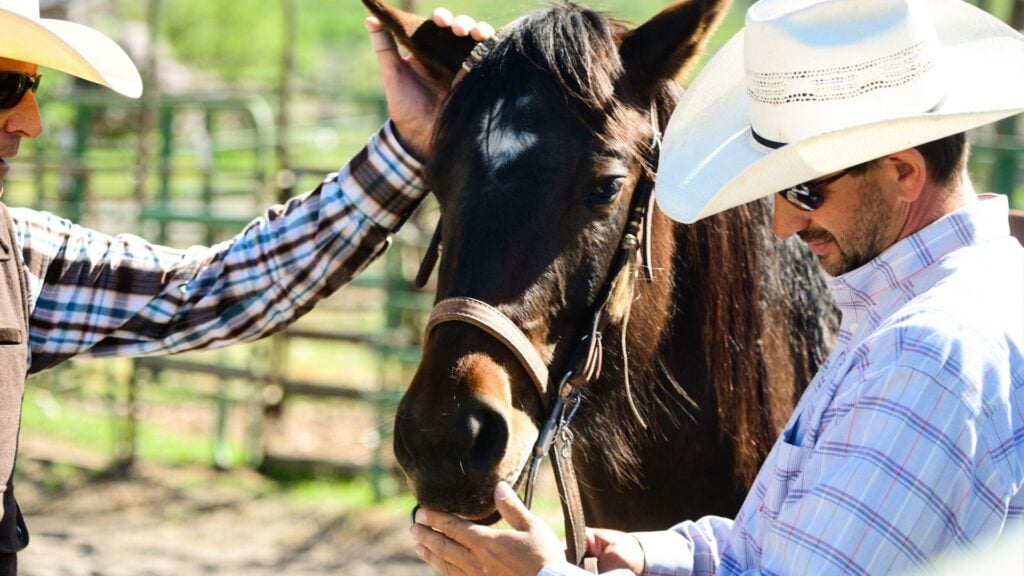
We all know that sellers paint the perfect picture when trying to get you to buy what they’re selling, but not everything that glitters is gold. That said, if you’re in the market to purchase a new horse, you should be very cautious, patient, and diligent before buying.
Before scheduling an appointment to view a horse, try to find out as much as possible about it. What breed is it? Has it competed in any sports or had a significant illness or injury? The horse community is relatively small in each region so ask around.
When I’m interested in a horse, I talk to people who are familiar with the owners. I like to know how the owners treat their horses and what people without a bias have to say about the horse.
Questions you should ask when buying a horse.
When buying a horse, there are a number of important questions to ask in order to ensure that you are making the best purchase for your needs. You are the buyer, meaning you have every right to ask any question; this isn’t the time to be shy. Ask specific questions, such as:
- How long have you owned this horse?
- Does the horse have any history of abuse or neglect?
- Does the horse have any conditions that need treatment?
- Does the horse have any documents of registration?
- Why are you selling the horse?
- Is the horse trained?
These are just a few important questions you should ask the seller when purchasing your first horse.
Before deciding whether or not that horse is right for you, it is essential to know beforehand if the horse has any medical ailments that can affect its quality of life.
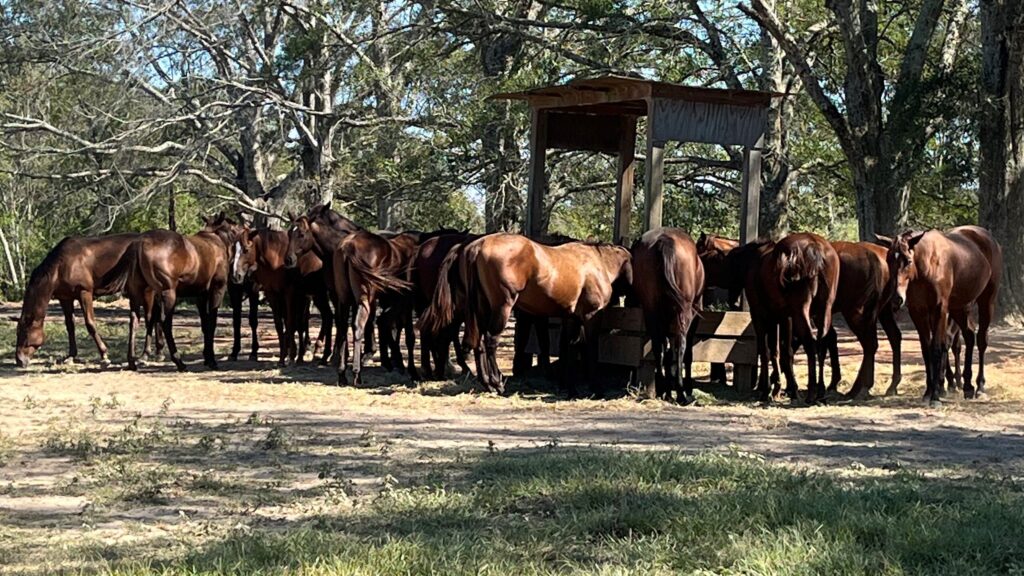
Sometimes sellers will hide specific details of the horse when selling them, so you must do your research before deciding. There are some conditions I rule out, but often I buy horses with problems. Recently, I bought a filly that was wormy and had rain rot.
However, she was well-bred, had good conformation, and the price was right. I knew with a little time and treatment, she would recover fully and grow to be a nice horse.
How to find the right horse.
Finding the right horse is tricky, especially if you don’t have much experience with them. Here are a few tips to help you choose a horse that’s right for you.
First, consider your riding ability. If you’re a beginner, look for a horse that is gentle and easy to handle. You need a well-trained horse with a steady temperament that anyone in your family can handle and ride.

Having a high-strung horse is dangerous and takes the pleasure out of owning a horse. Next, decide what you want to do with the horse. Are you looking for a trail horse to explore the outdoors or a show horse to compete in dressage or jumping?
Once you have a general idea of what you want, you can narrow your search. We owned an Appaloosa that wasn’t athletic enough for competition, so we decided to train it for the kids.
It didn’t take long to realize the horse was too much for children to handle; it often ran them under tree branches and turned back to the barn shortly after we got on a trail. However, it was a perfect horse with an adult in the saddle.
If you intend for children to ride the horse you’re considering, watch a child ride it to ensure it is kid-friendly. If you’re more experienced, you can look for a horse with more energy and spirit.
Think about your budget. Horses can be expensive to keep, so make sure you can afford the initial purchase price and the ongoing costs of food, care, and vet bills. I bought the grey filly pictured above at a reasonable price from a trainer who had too many horses to care for.
Finally, take the time to get to know the horse before you make a purchase. Spend time around the horse and see how it reacts to your presence. Ideally, you should find a horse that is friendly and curious and one that doesn’t startle easily.
With a little patience and careful consideration, you’ll be sure to find the perfect horse for you.
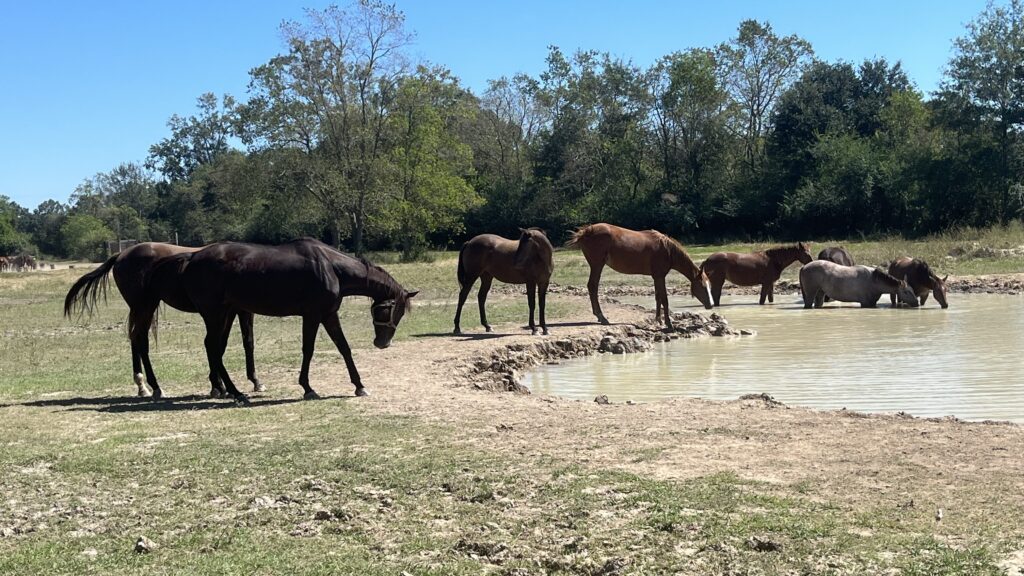
Where to find a horse for sale
A horse auction is one of the best places to find a horse for sale. Auctions are held regularly across the country and offer buyers a chance to purchase horses at all stages, and sometimes you can find great deals.
We have a couple of yearlings, two-year-olds in training, and mixed auctions for registered Thoroughbreds in Louisiana. Locally, we have a monthly livestock auction that sells everything from pigs to horses.
The downside to purchasing a horse at an auction is that you typically don’t get to see the horse handled or ridden, and it’s not unusual for an unscrupulous seller to sedate an anxious horse to mask bad behavior.
You can show up early at large auctions and check out the horses in their stalls. I’ve bought yearlings at auctions and have had great success. Another great option is to search online listings.
You can find many horses for sale on the internet, but there are drawbacks, such as scams or people getting rid of unhealthy or unsafe animals. If you go the internet route, I recommend joining some Facebook groups dedicated to horses.
And always get the seller to send you a video of them catching their horse, tacking it, and riding at a walk, trot, and gallop. You should request the same when you’re checking out a horse in person.
Don’t buy the horse if they aren’t willing to do this basic task. There is plenty of information on all types of riding disciplines and horse breeds available on the internet that can help in your search.
I find the best way to locate a good horse is through word of mouth. Get out there and spread the news to horse trainers, boarding facilities, and friends that you’re in the market for a horse. For example, I spread the word at the training facility that I’m interested in a retired racehorse to train as a good barrel horse.
If you go this route, let people know your riding experience level, budget, and the equine event(s) you intend to use participate in. Please don’t make the mistake of spontaneously buying the first one you see or choosing one because you like its color.
I often see young riders pick bad horses because they have their hearts set on a horse with a particular coat pattern or color. Never purchase a horse before seeing it in person or having it checked by someone you trust; pictures can be deceiving, and you don’t want to purchase blind-sided.
If you find a horse you like that is far away, contact a vet in its area and pay them to vet-check the horse. It will cost you some money upfront but may save you big in the long run. Don’t be shy; ask every question you can think of to ensure the horse fits your standards.
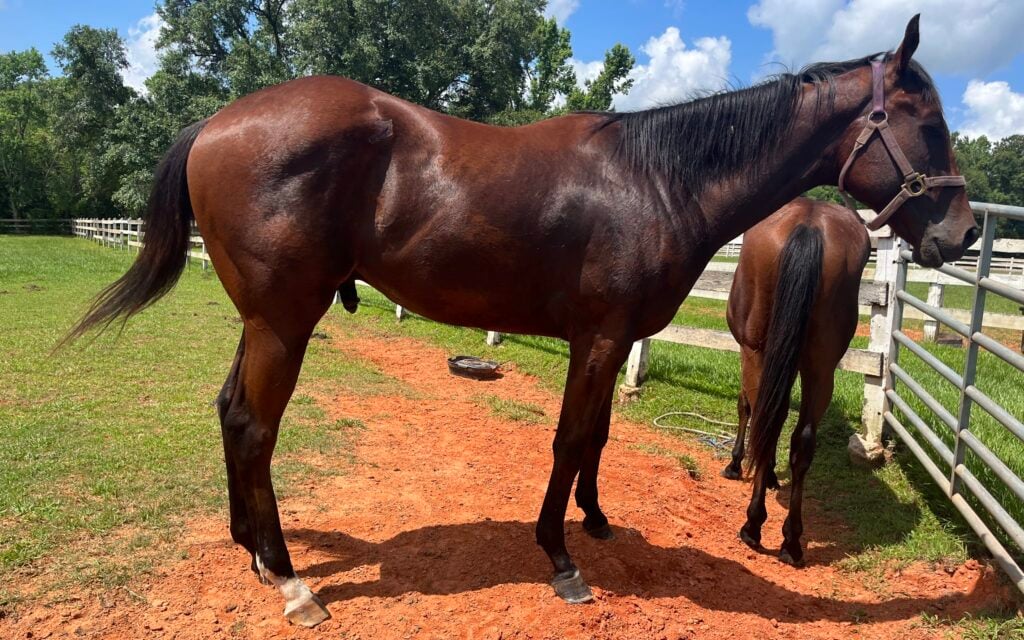
Visual Examination of a Horse.
Once you decide on a horse that suits your needs and has a suitable history, it’s time to schedule a viewing. Upon arrival, you should look the horse over, starting from the front, both sides, and behind. You should be looking for any obvious abnormalities.
Pay attention and look for any lumps or scars, and rub your hand on each leg with particular attention to the knees and lower leg joints for heat. I like to pick up each leg and position the hoof between my knees as a farrier would.
Check each of their hooves for cracks, possible deformities, thrush, or abscesses. Tap on the soles of the horse’s feet and note their reaction. They shouldn’t move or jerk away. Lastly, check their teeth for abnormal wear, which could indicate it’s a cribber.
Other things to check are: that the horse’s gums are bright pink and its manure is not too runny. Healthy horses tend to roll from time to time and usually shake off the dust after it has finished rolling, but a horse with digestive issues will show signs of looking to their sides when they finish rolling over.
An unhealthy horse may show signs of excess drinking, drooling, dropping things from their mouths, and loose or hard droppings. Some sick horses become stiff, indicating concern that the horse has a disease such as Laminitis or Tetanus.
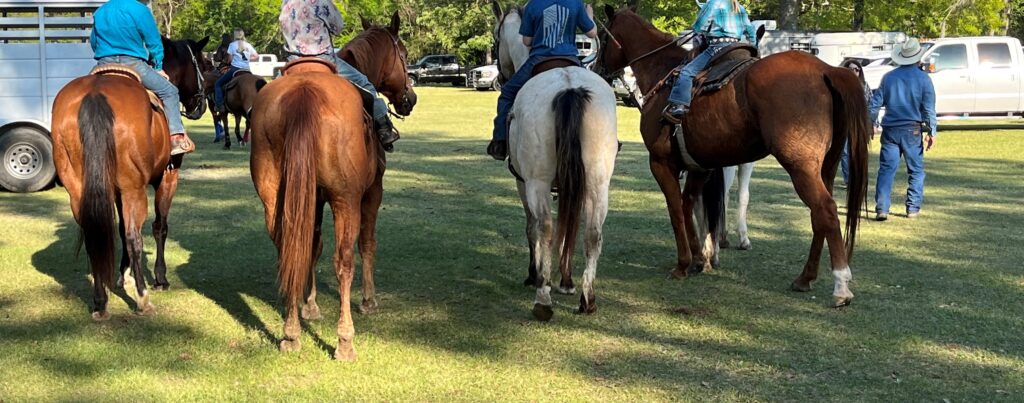
How to check a horse to find out if it’ll be a good fit for you.
Choosing a good horse is essential for any rider. Horses are not cheap, and you want to make sure that you get the best one for your needs. But it’s difficult to know for certain the horse you buy will be sound and fit your needs.
However, there are some things you can look out for when choosing a horse that will help increase your chances of finding a great animal that will be perfect for you.
A good horse should be alert and interested in you, it’s surrounding, and other horses nearby. Its eyes should also be bright and clear. I know of one horse trader with a reputation for drugging high-strung horses before showing them to potential buyers.
You can typically spot a drugged horse because its eyes look glassy and don’t react to movement quite right, and its ears hang to the side. You can easily overlook these signs if you’re not observant.
You should walk around the horse, rub its coat, pick up its feet, and pass your jacket or towel over its back. If the horse stands confidently, that’s a good sign the horse isn’t skittish.
As stated above, ensure the horse is in good health. While it may look healthy at first glance, the seller should allow you to inspect the horse before purchasing without any hesitation. If they are reluctant to let your vet check the horse or allow you to saddle and ride it, walk away.
The key to choosing a good horse is not to miss the obvious signs of a troubled horse. A good horse is alert, has good feet, is in good health, and doesn’t easily spook or have bad habits such as cribbing.
Below is a helpful YouTube video about what to look for when buying a horse. It also explains how to make a video for people who are interested in buying or selling horses on the internet.
Try a horse before you buy.
If you feel like the horse may fit your needs, ask for a test run to see how comfortable you feel on the horse. It’s also a good idea for you to tack up the horse; this is another opportunity to find out more about it.
When you ride, sit on its back for a minute or two without asking it to move. Then cue the horse forward, turn it both ways and stop. Ask the horse to back up and then move forward in a walk, trot, and canter. Try to get a good feel for the horse.
Sometimes, you can take a horse home and try it as a lease without committing to purchase. We’ve sold horses like this plenty of times. We felt confident that the more time they spent with our horse, the more likely they would buy it. If someone seems overly anxious to sell a horse, proceed with caution.

You should get a vet check before buying a horse.
Getting your horse vet-checked is crucial before making your final purchase so you can feel reassured that the horse is healthy. It’s a great way to get more information on the horse from a professional perspective and give you an insight into the horse’s health before buying.
This exam allows you to receive an unbiased and clinical opinion of the horse from a professional who will not sugarcoat any illnesses or history found, providing you with the confidence needed to make the right choice.
I recommend you choose your own veterinarian and not one selected by the seller to avoid biased opinions. It would be best if you also spoke with the professional performing the exam before he begins so he is aware of what your level of horse-riding is and what your intentions are to know what to pinpoint during the exam.
What is a vet check?
For those who aren’t aware of what a vet check is, it is an exam performed by a Veterinarian who does a complete physical examination on the horse to determine whether or not the horse meets your requirements for your intentions with the animal.
How it works is that the vet will speak to the seller of the horse to figure out whether it’s taking any current medications, history, injuries, or preventative care.
You decide how extensive his examination is, but a thorough exam starts by watching the horse while they rest and checking its vital organs, followed by accessing it while it works.
The vet then examines all four of its limbs by performing a flexion test. The joints are put under stress to determine whether the horse is suffering from lameness and other joint diseases that are not visible.
The horse gets put through various exercises, varying from walking, trot, and a canter, checking each gait. Additionally, the Veterinarian also performs several tests under a saddle, which they do to check for any abnormal striding, decreased flexion, and reluctance to work.
Additionally, if you have any doubts about the horse’s age and would like to confirm it with the vet, make sure to let them know, and they can confirm its age to see if it coincides with what the seller has told you.
Once they finish the exams, they consult with the seller to review the results and provide their professional recommendations. If they feel further examinations are needed, they will advise the seller and suggest more tests such as ultrasounds, x-rays, and blood tests.
How much does a vet check cost?
If you’re wondering how much a vet check will cost you, you can expect the pre-purchase exams to be anywhere between $200 to $300. However, pricing may vary depending on the type of horse intended to buy. Suppose you’re looking to purchase high-performance and competition horses.
In that case, these can entail more detailed exams such as Endoscopic testing, bone scans, drug tests, and thermography scans, resulting in a pricier vet check. These exams may take longer than the regular vet checks as certain horses require more testing.
Conclusively, you may be investing some of your money into a horse before even purchasing one, but this will ensure that you will end up with a horse that will suit everything you are looking for versus choosing one by its appearance.
Vet checks are vital for individuals purchasing their first horse because they rule out many problems that can go undetected not only by novice horse owners but also by experienced ones. I buy a horse I’ve been around or know the owners well without having it vet-checked.
I even buy sick horses occasionally if I believe I can get them healthy without too much expense. Recently, I bought a horse with a runny nose. The discharge was light and pretty clear; it had a cold that would resolve with little time to rest.
Conclusion
If you follow all of these steps, you can confidently make your decision and put an appropriate value on the horse, so you don’t overspend. So whether you’re a first-time buyer or you’re simply looking for ways to confirm a good purchase, you should have all the information you need to shop for a horse confidently.
If you want to know how much horses cost, I suggest you check out this article: How Much Does a Horse Cost? Buying and Ownership Guide.

About the Author: Miles Henry
Lifelong Horseman | Racehorse Owner | Published Author
Miles Henry brings over 25 years of hands-on experience training and owning Thoroughbred racehorses. Raised with Quarter Horses and Appaloosas, he’s spent a lifetime learning from horses—on the track, in the barn, and in the field. Today, he runs a small but successful racing stable in Louisiana and shares real-world insights on HorseRacingSense.com, helping horse owners, fans, and bettors navigate the sport with confidence.
📚 Books: View Miles’s books on Amazon »
🎧 Podcast Guest: Animal Tales Ep. 32 |
YouTube Interview
📩 Newsletter: Sign up for racing tips and horse care advice »
🔗 Follow Miles:
Twitter |
Facebook |
YouTube


